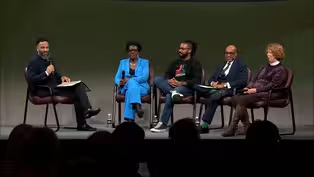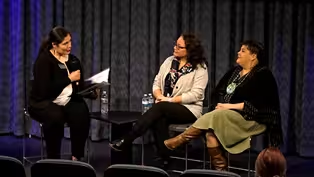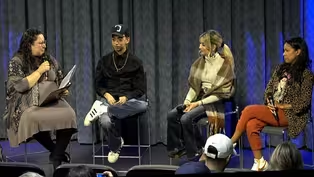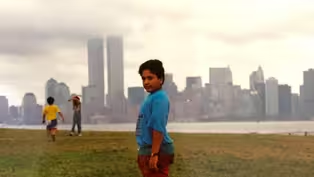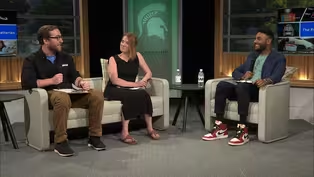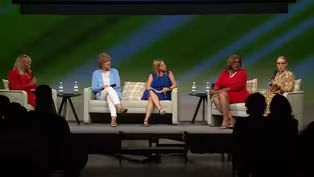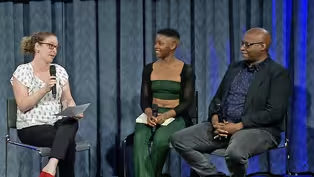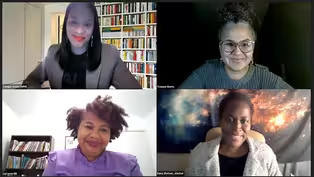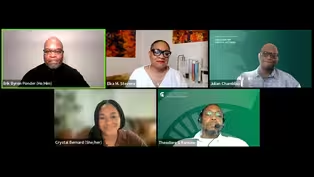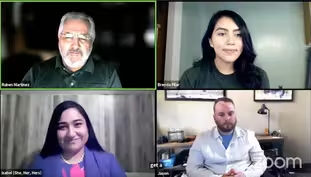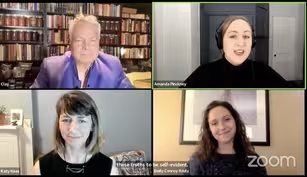
Panel Q & A – Free Chol Soo Lee
Special | 29m 48sVideo has Closed Captions
Panel discussion following the film Free Chol Soo Lee.
Panel discussion following the film Free Chol Soo Lee. With panelists Dr. Anna Pegler-Gordon, Professor of Asian Pacific American Studies at MSU’s JMC; R.J. Quiambao, Assistant Director of Eastern Michigan University’s Bright Futures; Dr. Sheng-mei Ma, Professor of English at MSU; Dr. Wally Wojciechowski, Assistant Professor at the School of Criminal Justice at MSU. Recorded 4/20/23.
Problems playing video? | Closed Captioning Feedback
Problems playing video? | Closed Captioning Feedback
WKAR Specials is a local public television program presented by WKAR

Panel Q & A – Free Chol Soo Lee
Special | 29m 48sVideo has Closed Captions
Panel discussion following the film Free Chol Soo Lee. With panelists Dr. Anna Pegler-Gordon, Professor of Asian Pacific American Studies at MSU’s JMC; R.J. Quiambao, Assistant Director of Eastern Michigan University’s Bright Futures; Dr. Sheng-mei Ma, Professor of English at MSU; Dr. Wally Wojciechowski, Assistant Professor at the School of Criminal Justice at MSU. Recorded 4/20/23.
Problems playing video? | Closed Captioning Feedback
How to Watch WKAR Specials
WKAR Specials is available to stream on pbs.org and the free PBS App, available on iPhone, Apple TV, Android TV, Android smartphones, Amazon Fire TV, Amazon Fire Tablet, Roku, Samsung Smart TV, and Vizio.
More from This Collection
Panel discussions following WKAR film screenings. Featuring filmmakers, policy makers, community partners and more.
Panel Q & A - The Cost of Inheritance
Video has Closed Captions
Panel discussion following the film The Cost of Inheritance. (30m 59s)
Video has Closed Captions
Panel discussion following the film Warrior Lawyers. (33m 42s)
Panel Q & A – First Voice Generation
Video has Closed Captions
Panel discussion following the film First Voice Generation. (31m 2s)
Video has Closed Captions
Panel following the film "American Jedi." Discussion features the film’s producers. (48m 46s)
Panel Q & A – NOVA Science Studio Showcase
Video has Closed Captions
WKAR showcases highlights from the NOVA Science Studio project. (53m 35s)
Panel Q & A – Building the Reading Brain
Video has Closed Captions
Panel discussion following the WKAR original film, Building the Reading Brain. (36m)
Video has Closed Captions
Panel discussion following the film Afrofantastic. Featuring filmmaker Julian Chambliss (29m 6s)
Panel Q & A - Storming Caesars Palace
Video has Closed Captions
Panel discussion following the film Storming Caesars Palace (25m 19s)
Video has Closed Captions
Panel discussion following the episode Afrofuturism, from the Artbound series (33m 56s)
Panel Q&A - Brenda's Story: From Undocumented to Documented
Video has Closed Captions
Panel discussion following the film Brenda's Story (25m 44s)
Panel Q & A - Benjamin Franklin
Video has Closed Captions
Panel discussion following the film Benjamin Franklin. (21m 46s)
Video has Closed Captions
Panel discussion following the film Unadopted. (31m 45s)
Providing Support for PBS.org
Learn Moreabout PBS online sponsorshipHello and welcome.
I'm Dr. Anna Pegler-Gordon, Professor at James Madison College at Michigan State University.
I'm glad you could join us for this screening of the film very astutely.
It's part of the Independent Lens Pop Up series of films presented tonight by WKAR.
We just view a shortened version of the film, the full 90 minute documentary will be streaming on Monday, April 24th at PBS.org and in the PBS video app.
For tonight's discussion, please enter your questions for our panelists into the comment box, and I'll ask them to the panelists as time allows.
Now, it was my pleasure to introduce our panel for tonight.
We have RJ Quiambao of Eastern Michigan University Bright Futures, Dr. Sheng-mei Ma of the English Department at MSU, and Dr. Wally Wojcieschowski of the Scho So let's start with a quick take on your reaction to the film and who would like to start us off there?
RJ Yeah, sure.
I guess I should should elaborate on my introduction.
Looking at the list of panelists here, I'm the only one that's not a doctor yet.
So my connection with Charles truly is that when I was the grad student, I lifetime ago at San Francisco State, I had the opportunity to work with Richard Cameron, who edited Charles Ulysses Memoirs.
And I was one of the primary transcriber.
So this story is very familiar to me, and I actually had an opportunity to meet both K.W.
and Charles too, at an event.
So it's very interesting seeing at least elements of the work I was doing back the surface into this documentary.
I think that one important thing that we can take away from the documentary, but also shows you the story, is that when we're talking about social movement right?
I think that oftentimes we can we can mark a moment of the work being done, so to speak.
Right.
And so with Chol Soo Lee's case, you know, that gross miscarriage of justice definitely a right to be wronged, this man's life was literally on the line.
There was a movement in order to get him exonerated.
It was successful.
And then, you know, that's where we usually drop the curtain and roll the credits.
Right?
This documentary did not do that.
It revealed what happened after the spotlight, so to speak.
And it's a reminder that just because the work may be done, there is still more work to be done.
So thank you.
Other panelists who would like to chime in.
Yeah, sure.
Yeah.
So it's a very interesting film and and a really important story to tell is we're in a really salient period as it pertains to race and its intersection with the criminal justice system.
And, you know, watching this, watching this film, it's it's a good example of how race and ethnicity do indeed intersect, both as it pertains to interaction with the law, but also in a you know, in a correctional setting where Tolstoy, he found himself between two rival gangs and, you know, was wasn't part of the group with either of them.
So which led to the the crime he committed in murder or the crime he committed in prison in that regard.
Yeah.
Thank you.
Yeah.
Sheng-mei Just following along, Wally said between two rival gangs, that's sort of the sad story of his life being an in-between character, sort of falling through the cracks and not just sort of the system falling through the cracks.
But if you think about it was born during the Korean War.
And of course, right after the split into North and South Korea and spent his early childhood in Korea, uh, his mother returned from the United States and got him to Canada, to California.
He had difficulty with English and with school as so many immigrant kids were.
And he belongs to the so-called 1.5 generation in Asian Asian-American studies.
Neither the first immigrant generation like myself nor the second generation new was born generation like my daughters, but some someone in between and sort of belonging to both, but belonging to neither.
And that kind of history sort of continues.
And I think the combination is really very, very sad that he is both the arsonist and the burn victim, burn by himself.
He is the perpetrator and the perpetrator.
At the same time, he talked about he was experiencing so much pain, enormous amount of pain since birth that he didn't really ask for.
So when he said that prison is evil, I was also wondering if life itself has been evil to him.
Thank you.
And it does.
I mean, his story really as an immigration historian, it really does disrupt this idea of America and the American dream, the sort of that the immigration always leads to better things.
I mean, he experienced that, as you said, sort of so painfully, his experience in the United States.
Well, I wonder if we can turn to you now as someone who works in criminal justice and think about what would the psychological and social consequences of exclusion on Chol Soo Lee's childhood and adolescence.
Yeah, so exclusion to me, I think means a little bit something different than that.
It might mean in this context when I think of exclusion, I think about peer rejection, that kind of thing, which I don't necessarily I don't necessarily see that which also if you had friends, even if he wasn't, you know, wasn't completely at home mentally because, you know, being Korean in Chinatown and in America as well, I would actually look to other exposures that he had in his childhood in terms of how it affects, you know, his psychology, at least as it pertains to, you know, his risk for offending things.
Like he talked about the abuse he suffered from his mom living in poverty, how he came over from, you know, how his life kind of uprooted right in the middle of childhood to move over here.
Those are the kind of things that I would look to to have the real psychological consequences as they pertain to like, you know, finding things like that, which were obviously salient in this regard.
Thank you.
Did anyone else want to respond to that question about childhood and adolescence?
Can I just add to that?
Actually, this documentary reminds me of several other documentaries Who Kill Vincent Chin and that, of course, there's Vincent Chin, bludgeoned to death by two white laid off unemployed automobile workers who blame Vincent Chin, thinking that he was Japanese and Japan took away their jobs and the automobile industry.
So once again, is the mistaken identity just noticeably a Korean-American mistaken for a Chinatown gangster who gunned down someone.
And also reminds me of first person, plural.
Why?
Well, you can't really see it so small.
The bush a limb.
And once again, it's the same kind of mistaken identity.
All look alike.
All Asians look alike.
Anyway, it doesn't really matter.
So it's interesting that all these documentaries revolving on the same kind of mistaken identity and the issue of adoption, all these things that I refer to, you know, cinching the ambush, a limb.
And several people were adopted at a young age, frankly, is totally any different.
I mean, he was left there until the age of 12 and his mother came back to claim him and brought him back.
And the only thing that he talked about was my mom used to be so, yeah, thank you for that.
Those connections, especially to very Michigan centered stories as well.
I'm also wondering about what are some of the measures that can be implemented to preserve, prevent recidivism, what kinds of programs are needed to support incarcerated people's well-being and to help them thrive, not just within, but also, I think in the way.
RJ you are sort of addressing earlier beyond kind of prison or beyond the sort of end of the movement.
And I wonder if we could start with you, Wally, on this.
Yeah, sure.
So in terms of implementing measures that could help prevent recidivism at this point, we've gone through, you know, the past 40 to 50 years with this tough on crime narrative that if we just imposed really harsh punitive sentences, then people will be deterred from committing crime.
And we simply know that that really isn't the most effective way to reduce recidivism for offenders who need rehabilitative treatment, programing, not only, you know, to provide vocational skills for once those individuals get out of jail or prison, you know, they we know that they're going into the world with some sort of skill to potentially be able to get a job and make do, but also general life skills and also skill building related to boosting impulse control, potentially addressing issues related to addiction.
This kind of psychotherapy that can really help to be effective in actually providing the skills that individuals can actually use once they get out into the community after exiting jail in prison.
Beyond that, I also think that we drastically need to reduce the ah, prison population in general by focusing more on providing community corrections, you know, using probation and other community corrections tools.
So we're not spending just a, you know, a crazy amount more locking people up and warehousing them in prison when we can much more cheaply on community corrections programs and and do so in a way that ensures public safety as well, because that's often a criticism of that.
But there's a lot more treatment availability in the community.
People can have a lot better capacity to actually choose a type of treatment not only that works for them, but also build a relationship with a clinician because the patient client, the patient clinician relationship is really important in that regard for success as well.
So I mean, that would be what I would say we need to start doing to start thinking about helping to implement programs that are going to be successful for reducing recidivism and also helping the incarcerated people's well-being when they come back into the community by providing them with the skills that are going to be necessary for them to be successful in society upon reentry.
Yeah, thanks.
Thank you very much for that.
I'm also coming back to the social movement question.
RJ, I was wondering how would diverse community groups able to unify around the free child style movement?
What what makes this coalition a unique movement?
And also how can an awareness of the free child's play movement influence solidarities and social movements today?
So if we start with you, I know that's a lot of quite a big question.
Anna Yeah, but and then if others also want to chime in as well, I think I already answered that last question about, you know, what we can learn from this this movement and apply it to today's movements.
Where does that work?
There's always more work to be done afterwards, Right.
But to address the first couple of questions, I think what made the free trial so Lee movement so compelling to a diverse number of people was really that gross miscarriage of justice that I had mentioned earlier.
Right?
So, you know, the reasons behind his initial conviction, for lack of a better a better word, were pretty wack.
Right?
So, you know, you've got the inability for people to determine or distinguish between different Asian-American ethnicities.
Right.
And then you have this preexisting animosity toward a certain group.
Right.
And so I'm glad that a Chin Nehemiah had referenced the Jin case because there's a lot of similarities here.
Right.
You've got, you know, the witnesses unable to tell that this was a Korean man, you know, caught in the midst of a Chinatown war.
And so it's putting the blame on him as well as this pressure put on the San Francisco Police Department to find the killer.
Right.
But I think if we're comparing to the social justice movement around Vincent Chin's murder, we can really look at how this ritual through Lieberman was different.
Right.
So the first thing that comes to mind is class.
Okay, So Vincent Chin was, you know, a Chinese-American engineer on the eve of his wedding night.
Right.
And so murdered.
That's a pretty dry case, in my opinion.
But as Chol Soo Lee said himself, right, he was on the outside.
He was neither an angel nor a devil.
Right.
But not maybe the most upstanding citizen.
And so you know, seeing that this this man who or this well, he was a young man at first was impoverished, right?
Maybe not on his best behavior, being supported by a movement of largely college students and professionals.
Right.
Was extremely compelling to me.
And I also think that the inability to distinguish from different Asian ethnicities is a common microaggression that in both cases had serious consequences.
I think I'll stop there for now.
Yeah.
Thank you.
Did anyone else want to comment on the sort of social movement and this particular coalition?
I just want to add one particular detail that even though in terms of class and change seems to be higher because it's an engineer, whereas Chol Soo Lee even has, he speaks with accent in English.
But I do want to emphasize that the venue in which reason.
Chang was having this fight with the two, the father and the stepson was at a strip joint.
So He was also moving from one social class to more or less the underworld, where a lot of darkness was exposed as well.
And I was, Oh, go ahead, RJ.
I'm reminded of another thing was that, you know, with the Vincent Chin case, right isn't Chin was already murdered, whereas with the feet you'll see Chol Soo Lee movement.
He was very much alive and I would consider his life to be in constant danger Every day, every moment he spent in prison, he was at risk of losing his life.
And so for that movement, there was a definite, tangible goal of saving, literally saving his life.
Right.
And I think that that especially with the preponderance of evidence that was coming up, made the movement successful and determined.
Yeah.
I was also just thinking about the question of masculinity as well.
I mean, both Chol Soo Lee and Vincent Chin in different ways, maybe one more outside the law and one more sort of squarely within the law of actually very sort of masculinity of a macho kind of guys.
And you know, that I think is sort of part of, you know, who they were at the time, but also sort of how they were remembered and and each kind of person in the movement.
In each movement, I think, also got a sense of that when people were talking about how he sort of represented also Lee represented Korea, that and I think actually Chol Soo Lee himself said I became a symbol.
Right.
Like it's the way that sort of for him for Chol Soo Lee the pressure people's expectations and the way that an individual becomes something larger than just who they are as a as an ordinary person.
So.
Chin, may I wonder also if we could, you know, turn to you since you sort of very much work in these areas of sort of narrative, narrative thinking about how we tell stories.
And I wonder how can we tell and amplify stories of underrepresented communities, right.
You know, given chosen these circumstances in life perhaps are underrepresented as they understatement in and of itself, I think.
I mean, you mentioned that some people see sort of a Korean history in him that worries me to some extent because he becomes almost this in-between figure.
It becomes almost a placeholder.
Different groups of people project their perceptions and desires onto him and expect him to live up with Asian-American activists, see a cause, a symbol, a movement in him.
And then, of course, he disappointed quite a few of them through the recidivism and so forth.
But then recidivism, you know, implies a relapse to crimes.
What happens if he has never left?
Did I mean, he lives in that kind of world.
There is no alternate universe for him.
That's the Asian-American actor seeing a symbol in him, Korean immigrants like his savior or was KW Lee the journalist, see Korea in him?
See the Korean sort of national sentiment of Han hate and resentment because of historical oppression and psychological, so to speak, Korea in him.
Actually, don't forget that the or the Korean audience burst into song after he was declared, you know, free and that song was Korean national anthem.
So they really see sort of Korea in him.
And of course, for whites, it doesn't really matter if they see a criminal in him, even though he was only five two and the killer profile was 510.
I think there is a eight inches difference there.
I mean, how can a police how can a legal system, you know, do sort of thing and just don't understand?
Yeah.
Other comments, respond says to the the question about sort of amplifying underrepresented narratives or communities.
I think that.
CHANG Mae, your your comment about this like weight of expectation writers and to me of sort of the weight of expectation that's often placed off of on second generation Asian-Americans like myself.
Right.
This idea that, you know, once we become the United States writer or or once our parents bring us the United States, there's this this, this promise of a better life, you know, which leads directly into this model minority myth where where, where, you know, we're expected to become, you know, doctors, lawyers, engineers.
Right?
Definitely not educators.
And I sort of I feel I feel, what, a little bit at least, which also Lee has felt when he, you know, sort of had to deal with this expectation of being like the symbol.
But also, what else am I right, when we look at where he came from?
Right, like before the movement, he was from the streets.
Right.
And so, you know, without proper support, he's just going to go back to what he knows right?
Yeah.
I don't know if Walter, if you had any thoughts about that or or other sort of sort of wrapping up comments, We have like sort of maybe 5 minutes left or so.
If anyone has final observations or thoughts.
We do.
I mean, it is also striking that, you know, in terms of what you were mentioning, RJ, about the sort of the movement in terms of support provided to him, to Chol Soo Lee, you know, that that was, I think, very hard in and it was hard for him to sort of really make that transition.
And the wall you spoke to some of the institution, you know, structures that can be put in place to sort of help make that happen.
But it was also interesting, the actual activists who were involved in the movement.
Right.
They did go on to really dedicate their careers, their lives to social justice, becoming labor activists, nonprofit leaders, lawyers, public defenders.
You know, so I think it's also interesting to think what are the impacts of being involved in this kind of movement on the people in the social movement as well.
And it certainly seems like it had a major impact there as well.
I wondered just in wrapping up, any sort of thoughts about legacies that today's activist base might have or what might motivate people to become activists in this present moment?
Do you consider yourself activists?
It's kind of interesting.
It's like do sort of activists, scholars, activists, educators?
I feel that, you know, Asian-American activists at the time in the seventies were really looking for a way to assert their importance through this kind of cause.
And they see a perfect opportunity in Chile.
I'm not quite sure the the kind of us Sino tension right now would allow that kind of thing to to happen.
I mean, the 1960s and seventies were a very, very sort of sort of vibrant and almost sort of opted optimistic kind of period.
Whereas our world right now is so ripe, so polarized perhaps the same kind of environment doesn't really exist today.
RJ Right.
You know, as, as former maybe current, maybe, I don't know, hobbyist, Asian-American scholar, right.
You didn't really hear I didn't know anything about the free chose to leave movement, even though, as you know and I had literally dedicated all of my undergraduate career for Asian-American studies.
And it wasn't until I was at San Francisco State when this came out and I am really thankful for the opportunity I had to actually work with the primary source, right?
Because, you know, it really opened my eyes that that I think that history isn't just like the stories that that necessarily make the news and this one, but just maybe not out in the Midwest here as much, but there, you know, there are stories everywhere.
And I think that that part of the responsibility of, you know, maybe like a scholar, activist or a historian is to try to stake out more of these stories.
Right?
Yeah.
No, I you know, I didn't know I was not familiar with the story until it was really sort of brought back through conversation with Chol Soo Lee.
So, Anna, you asked about the narrative.
Can I just point out one thing?
I hate to become sort of a car critic, but it really threw me off at first when I listen to Totally Talk is English has a distinct accent, and then later on in the first person voice over is becoming sort of a very fluent American English.
So I was really threw off.
I realized much later that the narrative was provided by Sebastian Yoon, who was part of the script writer.
And we're not talking about a historical figure like Abraham Lincoln, whose speech is has to be dramatized by an actor in the indie first person.
I so I wonder about this kind of documentary technique of clearly switching between his own voice with a distinct accent, and then the first person narrative, the voiceover with no accent whatsoever.
I mean, documentary pivots on authenticity.
The first person real story, life story.
And that seems to be sort of self-defeating to have that kind of first person voice over that is clearly not is voice.
Oh, that's that's a fair point.
It is not his voice, but it is his words.
And those are the words that RJ actually transcribed.
So it is interesting that I think they wanted rather than having a third person.
NARRATOR Right.
To sort of say this is what happened.
It was an interesting choice to make it almost into a sort of a second first person.
NARRATOR But I think it's a really great point about the accent because that, that, that was you could clearly hear that it different between Chol Soo Lee himself and then between the actor.
I will add though, right, having listened to all that that the interviews.
Right, is that he actually really is a very, very good storyteller.
Oh, I think if you have a chance to read his memoir, those the words that are in there are pretty much his words, you know, And I found it very impressive on his recall it attention to detail and someone in his life in prison.
I mean, I was transported there right even though like, you know, I was like starting and stopping on a foot pedal eve So, yeah, that's all the time we have for this evening.
But thank you very much to our panelists.
Thank you all for joining us for free channel solely presented by WKAR and our partners here tonight.
Events like this from WKAR made possible with support from people like you.
So thank you to those who have donated to KKR and goodnight.
Support for PBS provided by:
WKAR Specials is a local public television program presented by WKAR
